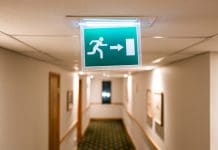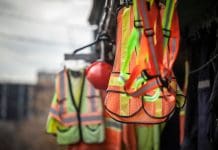The Building Safety Act will lead to fundamental change in the safe construction and management of buildings, including the specification and installation of passive fire protection systems
The need for accountable guidance on passive fire protection is clear and the Building Safety Act is designed to ensure that responsibility is taken at the top level by the owner or landlord. But to support this, accountability is needed at every level, with the skills and competence in place at every stage of the project from development through to installation.
Moving away from what could be described as a grey area in defining responsibility, the
Building Safety Act aims to address that lack of clarity by bringing into law the need for all
parties to take responsibility for their role in the construction of a building.
While the landlord must take overall responsibility to ensure necessary safety measures are in place, ensuring that those measures are up to scratch depends on specifiers, installers and manufacturers getting it right first time.
This model of shared responsibility is designed to cascade responsibility across every party
involved at any stage in the installation of passive fire protection. That means everyone
is accountable – those involved in development and testing, sales, specification and
installation – and the developer and landlord.
It is a wide field and the competencies required within that vary wildly.
How is competency defined?
Defining competency in passive fire protection is a major part of the ASFP competency pathway scheme, and in the wake of the Grenfell Tower fire, the Competence Steering Group formed the Firestopping Specialist Sector Group (FSSG) to define a framework for the future development and management of competence for firestopping specialists,
which is now in review stage.
But it remains up to the individual to demonstrate their level of competence. Usually this is done through possession of the relevant professional qualifications, and by completing CPDs to meet a certain number of points.
True competency is also about experience and wider understanding, which can be demonstrated by keeping up to date with the latest regulations through membership of industry bodies, such as the ASFP and IFE, in addition to networking to understand
related roles and responsibilities and to share industry insights.
This applies to every party, not just manufacturers of passive fire protection and fire consultants. Those specifying the product must be able to demonstrate they have the skill set to do that.
No exact standard or qualification is defined in the Building Safety Act for the
development, specification or installation of passive fire protection, leaving a level of interpretation for those involved – and for the Building Safety Regulator to judge.
Setting the standard
At FSi Promat, competency has always been central to the way that we work. This is what
gives us – and importantly our customers – confidence in our products and trust in the
technical support we provide.
All key members of the FSi Promat team are qualified to IFE Level 3 or above, including the technical department, which is integral to fire stopping product development and testing, as well as key sales and business development representatives, while newer members of the team are working towards the qualification.
We also ensure that new members of the commercial teams spend at least 40 hours working alongside the technical team within their first two months to ensure they’ve reached an adequate level of technical competency to advise on product suitability and specification.
The IFE Level 3 Certificate in Passive Fire Protection ensures that the knowledge and competency needed to understand the application of fire stopping is in place.
In tandem with knowledge, expertise is essential to truly understand what is needed to help protect buildings from the risk of fire over their lifespan. Experience is the key to
this and FSi Promat ensures that qualified, senior members of the team are always involved in key decisions.
While this is not a requirement of the Building Safety Act, it is a policy within FSi Promat.
Real-life experience is invaluable at identifying potential issues and understanding the impact of external factors, such as movement.
Passive fire protection and how it will work within different applications needs to be fully understood. This is where experience and diligence are second to none.
To support the correct application of fire stopping, FSi Promat carries out a multitude of testing around the world to ensure as many different applications as possible are covered.
Where there isn’t a tested solution, FSi Promat offers guidance and technical evaluations to advise on product suitability.
This checklist is essential to prove competence and compliance, but when penetrations are made into the seal of a wall by a qualified contractor, for example, there are myriad ways these could have been made.
The inevitable variance leaves an element of the unknown for penetration seals, with the sheer number of variables making it impossible to test every application.
Experience is vital to understand this process – where a bespoke installation is needed or, on occasion, where the application of the fire stopping is not suitable. Where a decision cannot be made based on testing, experienced members of the technical team will need to make a competency-based judgement always in line with PFPF guidelines.
The Building Safety Act places emphasis on technical competence
Directly involved in product development, testing and specification support, the need for clearly evidenced competence in a technical team has never been as critical to safety. While the act allows for individual interpretation, FSi Promat requires its technical specialists to have an up to date “competency CV”.
This is expected to demonstrate a set level of skills and training that allows for that knowledge to be applied widely – and that is constantly updated to reflect industry changes.
True competency and responsibility mean making difficult decisions and having the confidence to say a product is not suitable – that there is no tested solution, which can be a possibility when 1,000s of variations may be needed to cover all possibilities.
FSi Promat is always transparent where this is the case and will not compromise safety to win an order.
The high level of competency and technical expertise within FSi Promat does mean that bespoke, more complicated projects can be supported. With strong research and testing capabilities, backed up by competence through professional qualifications and experience, projects that fall outside of the scope of a ‘standard’ installation can be completed with confidence.
Duty of care
Competency in practice means knowing which product is right for a project and that it has been tested in that application. If an FSi Promat product is not suitable for a project then our technical team will always say so – we have that duty of care to say there is a better option.
This is a life-critical product, competency is essential. If someone in the chain gets it wrong, ultimately there are lives in danger.
“True competency is also about experience and wider understanding, which can be demonstrated by keeping up to date with the latest regulations through membership of industry bodies, such as the ASFP and IFE, in addition to networking to understand related roles and responsibilities and to share industry insights.”
Large developers will generally use professional third-party accredited installers, who in turn will be able to demonstrate competence in installation and will work in partnership with manufacturers to meet testing and specification requirements.
Responsible manufacturers of passive fire protection work closely with specialist fire installers to address technical queries, ensure the product is the correct specification and offer installation support where needed.
Where passive fire protection is being installed by a subcontractor, FSi Promat will offer product awareness training, supported by on-site support to ensure fire stopping and cavity barriers are correctly installed.
Raising the bar beyond the Building Safety Act’s standards
However, the flexibility in demonstrating competence and the huge variations in the application of fire stopping means there is a risk of projects slipping through the net – and complacency setting in.
Raising awareness is essential as the responsibilities around fire stopping become more widely understood – and FSi Promat will continue to proactively highlight the need for standards, evidenced testing and experience.
While demonstrating competency is attributed to each party separately, a collective effort to support high standards and make sure fire safety is fit for purpose is what is needed – there is no room for complacency, everyone needs to actively play their part in taking responsibility.
Craig Abbott
Technical director
FSi Promat
Tel: (0) 1530 515130














